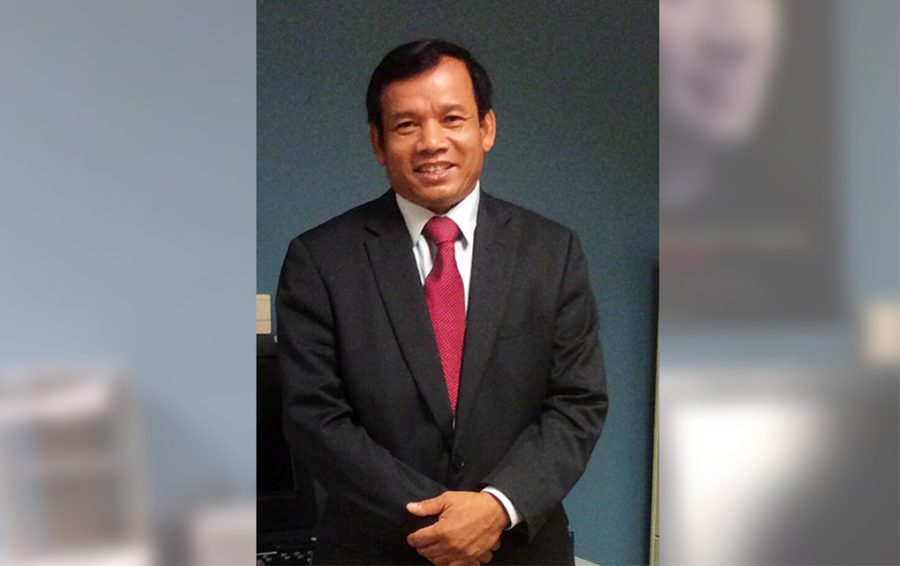While some CNRP-linked minor parties are eyeing consolidation to challenge the ruling party in the upcoming elections, one such party is choosing to try its own luck rather than joining the path of others.
Real Camerin, president of the Khmer Conservative Party and former CNRP lawmaker for Svay Rieng, said that as of now, he was not considering joining forces with other CNRP-linked parties and that he would run his party according to his own ability.
“I think that I and others don’t have the ability like Sam Rainsy and Kem Sokha. … So unity should not just be for the sake of unity. [If it’s] unity in order to be divided or broken up, I think I am willing to stay with our own selves and show our own ability. How much we can do — just let it happen,” Camerin said, referring to the CNRP’s co-founders.
He said he was happy for the parties choosing to come together, but questioned what they would be able to achieve and how long the unity would last among them.
“If they want to unite, why do they need to create parties? It means that they want to create parties in order to be a president,” he said, adding that recent Cambodian history, including the CNRP and Funcinpec, was littered with fractured opposition parties and coalitions.
Camerin said he still had supporters, and wanted to win some commune council seats in 2022 to represent them.
Others, however, have expressed a willingness to come together since ex-CNRP lawmaker Ou Chanrath made the call, saying it was the only chance of challenging the ruling CPP.
Kong Monika, president of the Khmer Will Party, said late last week that he was still willing to unite with other former CNRP politicians and other “democrats.” He said he was willing to merge into a single party or cooperate in other ways.
He had told Chanrath he would participate in a discussion. But Chanrath’s new Cambodia Reform Party has yet to be finally approved by the Interior Ministry, so Monika said talks could still be some time away, though he hoped it would be before the 2023 national election.
“If we just say ‘unity’ with our mouths — unity, but we don’t have the intention or real will to unite, the unity will fail,” he said. “We’ve clearly shown our intentions, and welcome a meeting to talk with all tendencies in order to find a possible formula to build up the democratic force again to lead to competition with the ruling party.”
“I believe that the Cambodian people could give a chance for democrats, especially political successors, in order to continue developing or building up the political space to be active again.”
The CNRP, the country’s main opposition party until it was outlawed in 2017, was itself formed as a merger between the Sam Rainsy Party and Human Rights Party in 2012. Some 26 of 118 senior CNRP officials who were banned from politics have applied for “rehabilitation” and been reinstated by the government, many of them turning to form new parties or joining existing minor parties.
Khoeuy Sinoeun, a founding member of Cambodia Nation Love Party, said he was in support of a merger among minor parties and combining forces. “The Cambodia Nation Love Party’s stance is to continue seeking the unity of all democrats.”
Kuch Ly, the president of Khmer United Party, also supported the idea. “The group of more than 20 people who have applied for political rights can be a rallied force for democracy in the future.”
Chanrath, of the Reform Party, said it was a long road ahead, but it was important to continue.
“I don’t feel hopeless yet. I still have optimism in uniting since some politicians think that it needs to continue to be political activity based on democratic principles. This is the important point,” he said. “We will not abandon it. What we do not agree with, we need to find any principle that can be acceptable for all.”
CPP spokesperson Sok Eysan, however, said he doubted the minor parties would be able to put up a serious challenge to the ruling party even if they merged.
“There are not many people who come back to politics. Only 26 people have received political rehabilitation, so it means that even if they are 100 percent [together], they are still losing to the CPP,” Eysan said.
Sam Kuntheamy, executive director of the Neutral and Impartial Committee for Free and Fair Elections, agreed that the new generation of opposition politicians would find it difficult to gain mass support.
Voters still did not trust those politicians like they did CNRP co-founders Rainsy and Sokha, and there has not been much time to prepare policy, Kuntheamy said.












